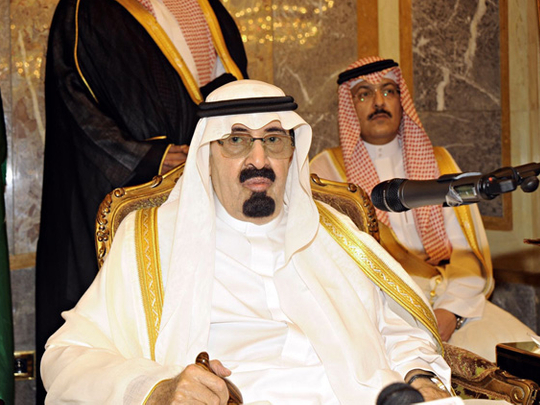
Dubai: Saudi Arabia's King Abdullah Bin Abdul Aziz is "deeply concerned" about the sectarian violence in Lebanon, state news agency SPA said, in an apparent reference to the killing of a Lebanese Sunni cleric opposed to Syrian President Bashar Al Assad.
"Saudi Arabia is deeply concerned and is following up on the recent developments of Tripoli events, especially the targeting of a main sect in the country's social fabric," Saudi state news agency SPA cited King Abdullah as saying in a letter to Lebanese President Michel Sulaiman.
"Due to the gravity of the crisis and the possibility of it causing sectarian strife in Lebanon and putting it back in the shadow of the civil war, we are looking at your ... attempts to interfere to end the crisis... and keeping Lebanon away from foreign struggles especially with the Syrian crisis nearby," the letter said.
Violence linked to the Syria conflict has spilled over into Lebanon, where soldiers last Sunday shot dead a prominent Sunni cleric and a member of a Lebanese political alliance against Al Assad in the northern city of Tripoli.
Saudi Arabia has long viewed Al Assad's government with distrust, pointing to its alliance with Shiite Iran, which Riyadh suspects of stirring up unrest in neighbouring Bahrain and among its own Shiite minority.
Riyadh has led Arab efforts to isolate Al Assad's government in an attempt to end its suppression of a year-long revolt and has called for Syrian rebels to be armed.
The UAE, Bahrain, Qatar and Kuwait have urged their citizens to stay away from Lebanon, citing security concerns.
Kidnapping
Lebanese Foreign Minister Adnan Mansour said yesterday that Lebanese Shiites allegedly kidnapped in northern Syria by insurgents hoping to trade the captives for detainees in Syrian government custody would be freed soon.
The rebel Free Syrian Army denied it was behind the kidnapping.
Meanwhile, the Syrian rebel bastion Rastan was heavily shelled yesterday and at least 12 people were killed across the country, according to monitors.
Syrian forces tried to storm Rastan under cover of heavy gunfire, shelling and rocket bombardment, reports said.
Soldiers are trying to overrun Rastan for the second time in 10 days, with shells crashing into the town at the rate of "one a minute" at one stage, according to a Britain-based watchdog.
An activist told AFP that Free Syrian Army fighters were defending Rastan's entrances, but that "regime forces are being strengthened with new deployments", including from the elite Republican Guard.
"Electricity has been cut off in Rastan, and water tanks have been shelled," said activist Abu Rawan. "There is also a severe lack of food because the market is closed and we can't bring food in from nearby villages."
Syria oil sector lost $4b
Syrian Oil Minister Sufian Allawi yesterday admitted that punitive measures imposed by the West have cost the country almost $4 billion and caused shortages in fuel products.
"The oil sector has lost almost $4 billion because of the unjust European and US sanctions, blocking exports and imports of oil and oil derivatives," he said. The minister acknowledged "new difficulties" in meeting Syria's energy needs, especially for domestic gas. "The measures taken by the EU and United States are behind this crisis. They want to put pressure on the Syrian people by widening the embargo," he said, adding: "We will also overcome the new difficulties."
Allawi said negotiations were under way with Russia for a long-term energy deal, while a Venezuelan vessel loaded with 35,000 tonnes of fuel oil docked in Syria this week and another was expected shortly.










